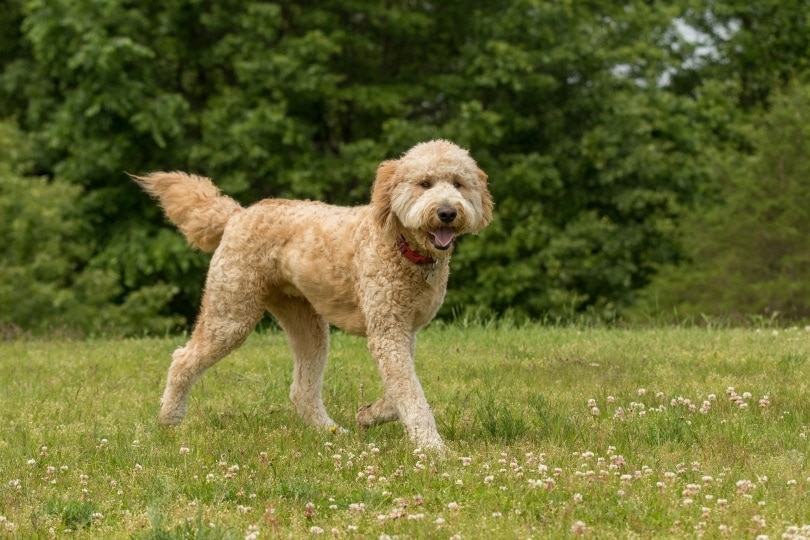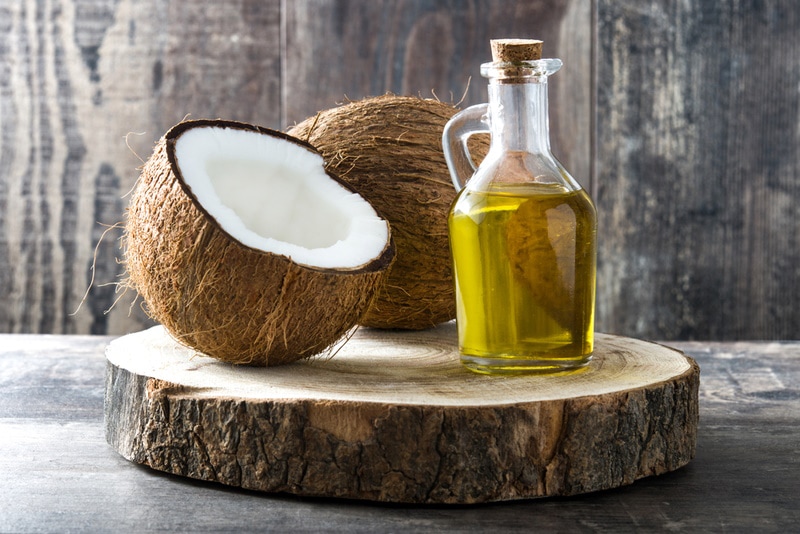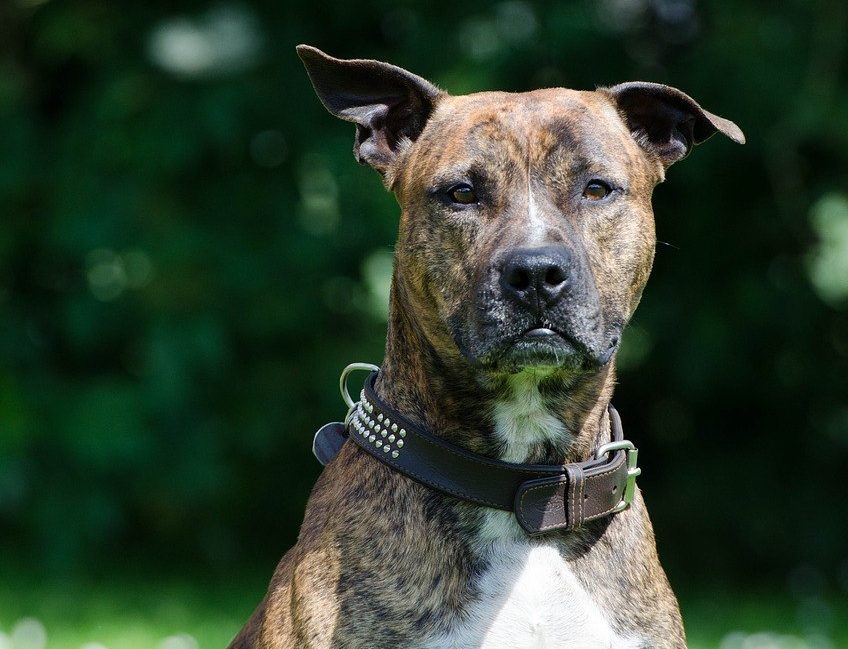How Long Do Goldendoodles Live? Vet Reviewed Lifespan, Data & Care
Updated on

Click to Skip Ahead
The Goldendoodle is a mix between the Golden Retriever and the Poodle. If you adopt a Goldendoodle, you’ll have a lovable, highly intelligent puppy that is affectionate and loyal. Since they may inherit more of the Poodle’s traits, their coats shed less than the Golden Retriever’s. Compared to other dogs that are similar in size and weight, the Goldendoodle has a relatively long lifespan of 12-15 years. We’ll discuss the factors influencing the dog’s lifespan and what you need to know when raising this exceptional hybrid pup.
What’s the Average Lifespan of a Goldendoodle?
The average life expectancy for a Goldendoodle is between 10 and 15 years. The Standard Poodle parent has a life expectancy of between 12 and 15 years, and the Golden Retriever has an average lifespan of 10 to 12 years.
Of course, that will depend on various factors, such as medical history, nutrition, the environment the dog is raised in, and their healthcare and breeding history. That’s not all that goes into helping your Goldendoodle live to a ripe old age, so we’ll talk about each of those and more in our next section.

Why Do Some Goldendoodles Live Longer Than Others?
As with any other breed, some Goldendoodles live longer than others. Quite a few factors are at play here, so we’ll look at a few of them now.
1. Nutrition
A Goldendoodle will need a complete and balanced, high-quality, protein-rich diet to stay healthy and happy. When searching for the right diet for your pet, look for brands with meat proteins listed as the first ingredients. Chicken, turkey, beef, and fish are ideal proteins for your Goldendoodle.
It’s important to note that some food isn’t meant to be fed to Goldendoodle Puppies, so check the bag to make sure the food is for the stage of life your Goldendoodle is in, whether the dog is a puppy, an adult, or a senior.
One of the health issues that Goldendoodles can develop is hip dysplasia, so make sure that you supplement your dog or find a diet that contains both glucosamine and chondroitin to promote joint protection if your pup develops joint issues.
It’s extremely important to watch how much you feed your Goldendoodle as overfeeding can lead to overweight and obesity, which will put extra pressure on your dog’s joints, and it comes with its own health problems. If you’re unsure how much food you should give your Goldendoodle, consult your vet for recommendations.

2. Dental Hygiene
You should start looking after your Goldendoodle’s teeth as soon as possible since their dental hygiene can have an impact on their general health. Dogs typically don’t enjoy having their teeth brushed, but if you introduce them to the procedure soon after you bring them home, the process will go smoother. Dental issues such as periodontal disease can affect your dog’s health and quality of life just as they can affect a human.
You can start by brushing your pup’s teeth every other day for a few weeks to get your Goldendoodle used to having their teeth brushed, but you need to start brushing them daily after the first few weeks to achieve good results. In addition to brushing their teeth at home, your Goldendoodle may need professional cleanings from a veterinarian at some point in their life.
3. Sex
Goldendoodles are pretty healthy pets, but they are prone to certain health issues, which we’ll go into below. Female Goldendoodles that are not spayed are susceptible to uterine infections (pyometra) and mammary tumors. A 2019 study found that spayed females lived an average of 30 weeks more than sexually intact female dogs. The improvement in life span in neutered males was not as obvious (3 weeks difference) but still present.

4. Size
Most Goldendoodles are bred from Standard Poodles, but some breeders use Miniature and Toy Poodles. There is the Miniature Goldendoodle, which weighs between 25 and 35 pounds, and the Toy Goldendoodle, which only weighs between 10 and 25 pounds. Finally, there is the Standard Goldendoodle, which weighs 50 to 90 pounds.
Typically, smaller dogs live longer than larger dogs on average, so the size can be taken into account when determining the life expectancy of a Goldendoodle. However, some Standard Goldendoodles can live up to 15 years which is still a great life expectancy considering their age.
5. Exercise
The amount of exercise your Goldendoodle gets will have an impact on their general physical and mental health. Your Goldendoodle loves to run, swim, and even go on hikes. Swimming is a good form of exercise for you and your pet and will keep your Goldendoodle physically and mentally fit.
Your Goldendoodle will need approximately a couple of hours a day of exercise, and you can divide the total time into long walks, swimming, and canine sports like flyball or fetch. Your pet will enjoy everything from catching a Frisbee to figuring out their puzzle toys, which will help keep the dog physically and mentally sharp.

6. Health Conditions
There are a few health conditions that your Goldendoodle could be predisposed to. Whenever possible, reputable breeders try to breed out those problems, and it’s vital to get health documents showing the tests performed on the breeders’ stock.
Some conditions to watch out for include hip dysplasia, glaucoma, cataracts, and progressive retinal atrophy (PRA). Visiting the vet for bi-annual checkups is essential to keep your Goldendoodle healthy. Veterinarians can treat health problems more effectively when they catch the issues early.
The 4 Life Stages of a Goldendoodle
Your little Goldendoodle has four life stages, and we’ll discuss the stages below.
Puppy
Bringing home your new puppy can be a joyful time, but it can also be a bit overwhelming. You can expect your puppy to be energetic, incredibly curious, and chew on everything in sight since it will be teething at some point.
The Goldendoodle is highly intelligent, and puppyhood is a critical time to train your pet. Make sure you provide tailored mental stimulation and training sessions. Your puppy will be in the puppy stage until it reaches around 8 to 12 months of age, so enjoy this time together.

Young Adult
In the young adult stage, your Goldendoodle will keep growing and developing their personality. They reach this stage at around 12 months old, but they will continue to develop until they are around 2 or 3 years old. You’ll want to change the food from puppy food to an adult blend at this stage. Exercise should be modified to meet your young adult’s needs, and training should continue. It’s best to use positive reinforcement with your Goldendoodle. They are highly intelligent, so you shouldn’t have a problem training them.
Mature Adult
The Goldendoodle is considered a mature adult from 2 to 10 years old. They will be a bit calmer than they used to be but still highly active and energetic. At this stage of life, your pet will need at least a couple of hours of exercise daily. You can also take the dog for a swim since most Goldendoodles love the water.

Senior
When they are approximately 10 years old, Goldendoodles are considered seniors. You’ll need to monitor the dog’s health at the senior stage and maintain regular vet appointments. While the dog still needs regular daily exercise, the exercise needs to be gentle and adapted to their needs. Based on your veterinarian’s advice, you may need to start your dog on any medication or supplements for any health issues that they may develop.
How to Tell Your Goldendoodle’s Age
Sometimes, you don’t adopt your Goldendoodle as a newborn pup and need to know how old your new friend is. It’s not that hard to tell the age. One key indicator is the dog’s teeth; however, the diet and chewing habits will affect how your dog’s teeth look. If your pup is 1 to 2 years old, they would normally still have clean, white teeth. An adult between 3 and 5 years of age, will have some tartar buildup. At 8 to 10 years old, they may have some damage to their teeth, and between 10 to 15 years old, you might find the dog has missing teeth. Contact your vet for an appointment to determine the approximate age of your Goldendoodle.
Conclusion
Goldendoodles can live for up to 10 to 15 years on average. Of course, each dog will be different, depending on the factors we listed above. If you take care of your Goldendoodle by maintaining routine vet appointments, watching for signs of health issues, and feeding them a high-quality, complete and balanced diet with plenty of tailored exercise and mental stimulation, your pet will have higher chances of living a good long life. If you’re considering giving a Goldendoodle Dog a forever home, following the tips above will ensure you do as much as you can to have a companion for quite some time.
Featured Image Credit: Megan Betteridge, Shutterstock















